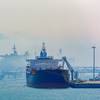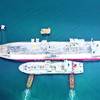Authorities along the length of France's Atlantic coast were on alert last Wednesday as a giant fuel oil slick slowly drifted south of Brittany, threatening an ecological disaster. Maritime officials said two navy ships were heading for the slick equipped with floating booms and giant vacuum cleaners to try to contain and pump the oil which escaped from the sunken Maltese-registered tanker Erika.
Three more vessels, including a British ship, also equipped with vacuum pumps, were scheduled to join them on Thursday, and a Norwegian ship was due on Friday. Transport Minister Jean-Claude Gayssot said France had also asked for help from Germany and Spain.
Despite the international response of equipment and personnel, stormy seas were threatening to hamper the pumping.
Computer simulations showed that, depending on wind changes, the slick could drift slowly towards the Franco-Spanish border or head for the coast just south of Brittany. An emergency government unit was set up in the port of La Rochelle, further south, to collect information and gather anti-pollution equipment and personnel. It was reported that tests on samples showed the fuel "looked like chocolate mousse and was as gooey as honey." But the oil, a dense product left after refining, was getting less viscous after four days in seawater, which would make it easier to pump.
The Erika, carrying up to 25,000 tons of fuel oil, sank in stormy Atlantic seas off northwestern France on Dec. 3, according to the Cross Maritime Rescue Center.
The tanker's stern, which contained most of the oil, sank as it was being towed farther out to sea to try to avoid pollution on Brittany's tourist coast.
The bow disappeared earlier beneath the waves, about 24 hours after it split from the stern 45 miles south of Brittany's rugged Finistere Peninsula in 60 mph winds and 20-ft. (6 m) waves. Helicopters rescued the 26 crew members on Dec. 12. Maritime authorities were trying to establish whether the stern sank onto the relatively shallow continental shelf or into much deeper waters.
Steamship Mutual is the insurer for the tanker Erika, and the club's general liability limit on oil pollution risk is $500 million. The limit for pollution risk for Erika's owners would be between $9.5 and $11.5 million, assuming France was the only country potentially at risk from oil pollution, a spokesman for the International Oil Pollution Compensation Funds (IOPC) said. The IOPC Funds liability would be up to $170.4 million.
The busy shipping channel off Brittany has seen a string of wrecks, including the Amoco Cadiz, which spilled over a million barrels of oil in 1978 in Brittany's worst environmental disaster. The seas in this area have been infamous since pirate times, with shipwrecks woven through the history of France's westernmost islands of Ouessant and Sein, north of where the Erika broke up.
"Who sees Ouessant sees his blood, who sees Sein sees his death," one popular saying goes. - (Reuters)
Sponsored Content
Solar shades of exceptional quality

Subscribe for
Maritime Reporter E-News
Maritime Reporter E-News is the maritime industry's largest circulation and most authoritative ENews Service, delivered to your Email five times per week









